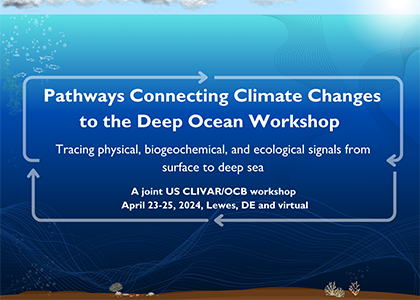Pathways Connecting Climate Changes to the Deep Ocean: Tracing physical, biogeochemical, and ecological signals from the surface to the deep sea (OCB/US CLIVAR joint workshop)
April 23-25, 2024 (University of Delaware, Virden Center)
This workshop will bring together observational oceanographers and modelers across physical, biogeochemical, and ecological communities to assess our understanding of pathways connecting the surface to the seafloor and to develop recommendations for improved detection and attribution of change in the global deep ocean system.
Workshop goals:
- Provide an updated comprehensive assessment of the deep ocean’s state and changes across disciplines, of key quantities in which these changes are expressed, and of pathways and timescales connecting the surface to the seafloor.
- Review existing observation and modeling tools and their adequacy for constraining, understanding, and attributing changes in the deep ocean system. Identify critical knowledge and observational data gaps and model deficiencies.
- Develop a collective set of recommendations for improved detection and attribution of change in the global deep ocean system, with a focus on better serving and supporting deep ocean science across disciplines.
- Build an interdisciplinary network of ocean modelers and observers across disciplines. Our aim is to open communication channels and facilitate collaborative exchange of data, knowledge, and tools across communities.
The workshop welcomes the participation of scientists from fields across the ocean observing and modeling communities, spanning physics, biogeochemistry, and ecology. We welcome insights from highly localized to global-scale studies as well as efforts focused on individual disciplines, but we strongly encourage all participants to consider how their work can increase opportunities for other disciplines/communities to have a collective impact.
We also encourage participation from relevant oceanographic networks and observing campaigns (e.g., Deep Argo, BGC Argo, GO-SHIP (Global Ocean Shipboard Hydrographic Investigations Program) and Bio-GO-SHIP, JETZON (Joint Exploration of the Twilight Zone Ocean Network), ECCO and ECCO-Darwin (Estimating the Circulation and Climate of the Ocean), DOSI (Deep Ocean Stewardship Initiative), Challenger-150, PICES (North Pacific Marine Science Organization) to ensure broad disciplinary representation and connectivity to established programs.
Scientific Organizing Committee
Xinfeng Liang (Univ. Delaware), Monique Messié (MBARI), Leslie Smith (Your Ocean Consulting LLC, DOOS), Isabela Le Bras (WHOI), Patrick Heimbach (Univ. Texas, Austin), Helen Pillar (Univ. Texas, Austin), Zachary Erickson (NOAA/PMEL), Charlie Stock (NOAA/GFDL)




